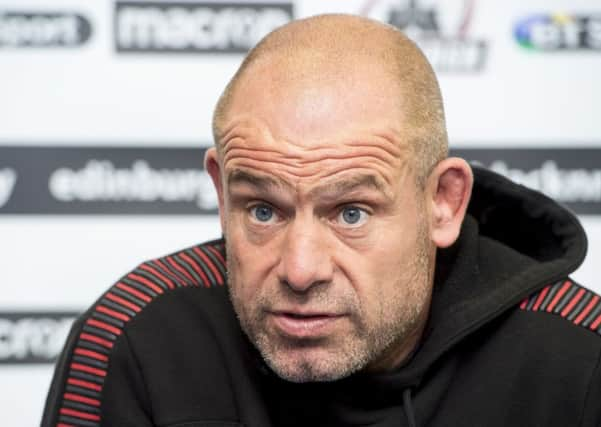Allan Massie: Cockerill must make Edinburgh hard to beat


Meanwhile, after four rounds of the new Pro14, how are our two teams managing the transition to a new coaching regime? Well, one might say that their results are much as they might have been if there had been no change. Glasgow have won 4, lost 0, Edinburgh won 2, lost 2. It’s not too surprising. Dave Rennie is building on what Gregor Townsend achieved. Richard Cockerill, pictured, is engaged on a repair job. Rennie is certainly bringing a New Zealand intensity to Glasgow, but, so far, one might say that the biggest impact he has made to date has been the recruitment of Callum Gibbins. As for Cockerill he is still re-arranging the pieces on the chessboard.
Glasgow were very impressive against Munster, playing in a style that recalled their defeat of Munster in the 2015 Pro12 final. The forwards were dynamic though, for most of the match, they struggled in the set scrum. Much of the off-loading was excellent, even if not quite in the Leone Nakarawa class. Finn Russell was near his best, demonstrating his rare ability to control the pace of a match. Young Scott Cummings is more formidable every time one sees him. So things look set fair, especially when you think that Stuart Hogg and Jonny Gray haven’t yet played, and Tommy Seymour for only half a match.
Advertisement
Hide AdAdvertisement
Hide AdIt was no disgrace for Edinburgh to lose to the Scarlets in Llanelli, especially since they played most of the second half with only 14 men, after getting back into the match with a good try just before half-time. The Scarlets are not only the best of the Welsh clubs, but the current League champions. Their back division, orchestrated by Rhys Patchell, is as good as Glasgow’s. There’s talk of Wales intending to play a more ambitious game. I’ll believe that when Warren Gatland picks Patchell at 10 instead of Dan Biggar.
Edinburgh were too often penalised for holding on at the breakdown, especially when they were on the attack. Referees’ interpretation differs, and some may have thought John Lacey too severe. Still you play the referee of the day, and it may often be wiser to concede a turnover rather than a penalty in the opposition 22. If you are turned over you lose possession. If you are penalised you lose territory and, usually, possession too from the resulting lineout. Furthermore, even if you are turned over, the opposition still has to find a way to get out of their 22, and may well muck up their exit.
Edinburgh seem to lack a controlling figure. When Duncan Weir moved from Glasgow, it was expected he would be the man to exert control. But he’s not quite on his game. He has many gifts but his outstanding quality used to be his self-assurance. Now his confidence seems low and so he makes mistakes and isn’t able to take charge of a match. Perhaps it needs only one good performance to put things right. At present he looks like a tennis player whose game is in trouble because he has lost confidence in his serve.
The young back row of Hamish Watson, Magnus Bradbury and Jamie Ritchie looks good, and indeed one thinks that Edinburgh are not far off from being a good team. But then one has thought that several times over the last two or three years, only for them to follow a fine performance with a dismal one. Such inconsistency is exasperating for any coach and a hard thing to put right.
At present when things go well for Edinburgh it’s usually because of a spark or two of individual brilliance. Cockerill is a Leicester man through and through, and one of the features of Leicester’s play in their great years was that they didn’t rely on moments of individual flair any more than Munster did in the days of their European triumphs.
It’s still early days for Cockerill and it takes time to change the attitude, and indeed the character, of a club. But it’s precisely that sort of change that is needed at Edinburgh. Even very good teams lose matches, but the best ones usually force the opposition to play well to beat them. Edinburgh over the years have too often made so many mistakes and errors of judgment that you might have thought they were collaborating with their opponents.
Making Edinburgh hard to beat is surely Cockerill’s most urgent task. When you are regularly hard to beat, you are much closer to winning. That’s a lesson Connacht, for instance, taught as they rose from being the poor neglected relations of Irish rugby to winning the Pro12 title.